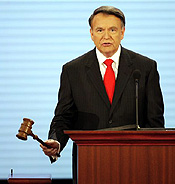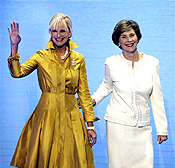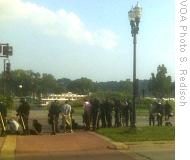VOA标准英语2008年-Republicans Open Convention With Low Key Appeal(在线收听)
The opening day convention schedule was truncated out of respect for those bearing the brunt of Hurricane Gustav. It began with the singing of the national anthem:
Then the formal business began, as Republicans and state delegations worked through procedural steps required to nominate Senate John McCain as the Republican presidential nominee, and Alaska Governor Sarah Palin for the vice presidency. But the celebratory speeches originally planned for the opening day were canceled.
 |
| Republican National Committee Chairman Mike Duncan calls the convention to order, 01 Sep 2008 |
Republican National Committee Chairman Mike Duncan called the convention to order, asking the approximately 5,000 delegates to keep those affected by Hurricane Gustav in their prayers.
"We must act to officially nominate John McCain and Sarah Palin for the presidency and vice presidency," said Mike Duncan. "So, while honoring our call as Americans, we fulfill our duty by receiving the report of the credentials committee, adopting the rules of the party, adopting the party platform and finishing other business required by our party rules and bylaws."
Republican lawmaker Kevin McCarthy used his remarks to emphasize sharp differences between Republican and Democratic policies, here speaking about energy.
"For those who say there really is no difference between the parties, this platform will prove them wrong," said Kevin McCarthy. "In energy policy, there are those who don't want to use American resources, and that means more Middle Eastern oil. We disagree."
 |
| Cindy McCain (l) and Laura Bush at the Republican National Convention in St. Paul, Minnesota, 01 Sep 2008 |
Instead of the planned speeches by President Bush and Vice President Cheney, First Lady Laura Bush and Senator McCain's wife, Cindy, focused on relief efforts for the U.S. Gulf coast and appeals to Americans to contribute aid:
Laura Bush: "Events on the Gulf coast region have changed the focus of our attention, and our first priority today is to ensure the safety and the well-being of those living in the Gulf coast region."
Cindy McCain: "As John has been saying for the last several days, this is a time when we take off our Republican hats and put on our American hats."
As the convention began, vice-presidential nominee-to-be Palin announced that her 17-year-old daughter, who is unmarried, is pregnant.
A social conservative and opponent of abortion, whose selection by McCain was aimed in part at securing that part of his political base, Palin issued a statement saying she is proud of her daughter, who will marry the father of the baby.
President Bush was in Texas Monday visiting emergency operations centers dealing with Hurricane Gustav.
The timing of the convention, and the simultaneous strike on the Gulf Coast by Hurricane Gustav, provided Republican and Democratic presidential candidates an opportunity to underscore their concern.
Republicans launched a hurricane fund-raising relief effort. Democratic presidential nominee Senator Barack Obama urged supporters to donate to the Red Cross and other organizations.
 |
| Protesters arrested in a field behind the Minnesota Science Center, 1 Sep. 2008 |
Between 8,000 and 10,000 demonstrators marched in the heavily guarded streets outside the convention site, protesting Bush administration policies and the Iraq war. Police reported making five arrests.
In Washington, officials of the U.S. Government's emergency management agency (FEMA) praised local and state preparations for Hurricane Gustav, including evacuations in Louisiana.
FEMA, and the Bush administration, were sharply criticized in the aftermath of Hurricane Katrina, which struck the Gulf Coast three years ago, devastating sections of New Orleans with flood waters.